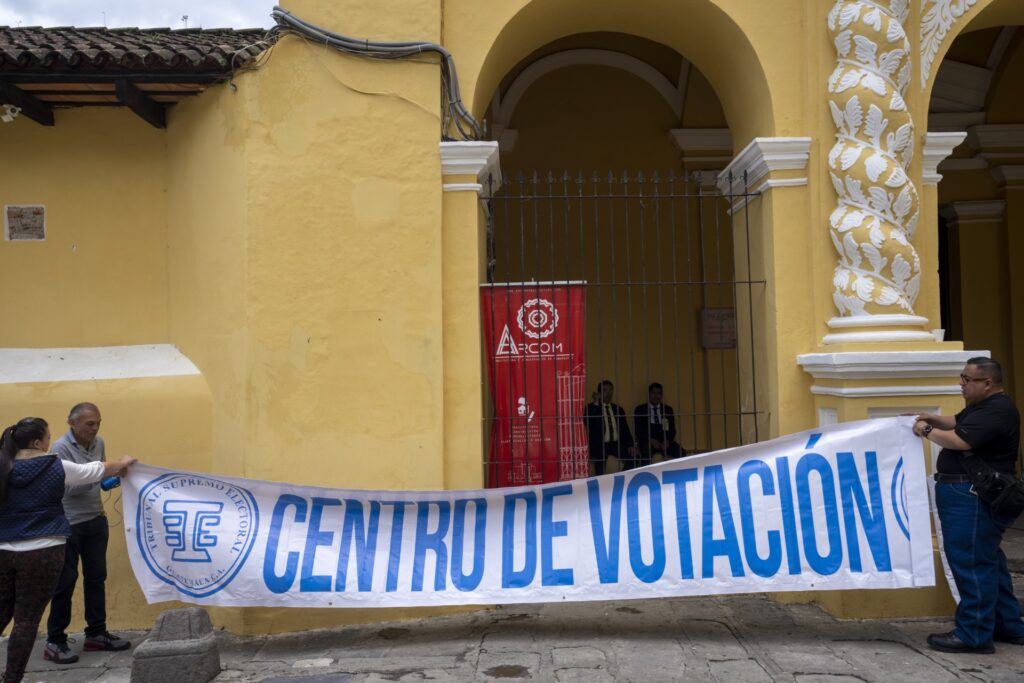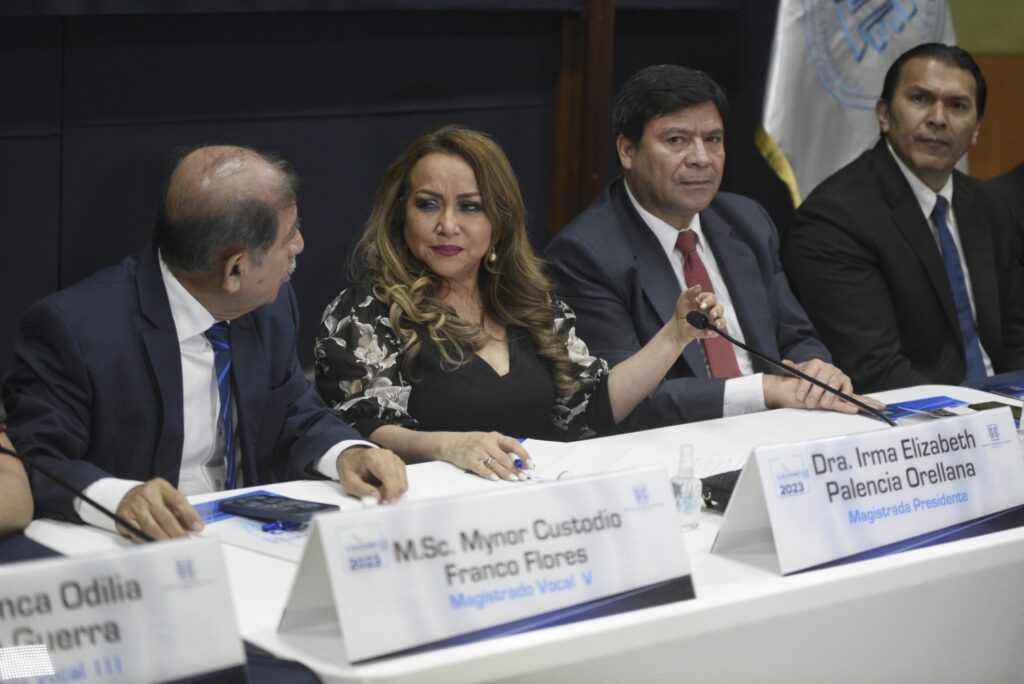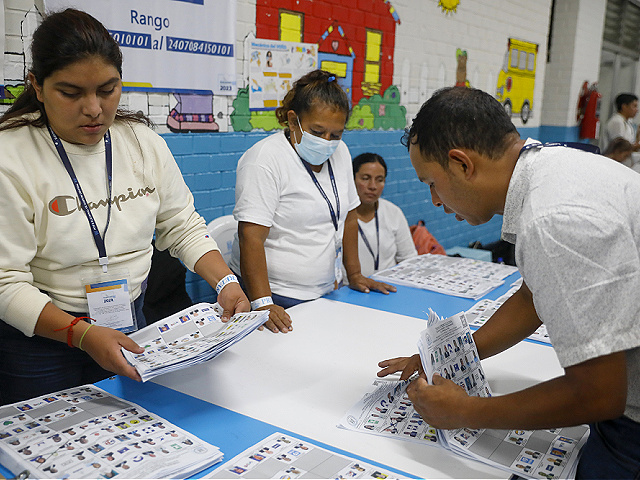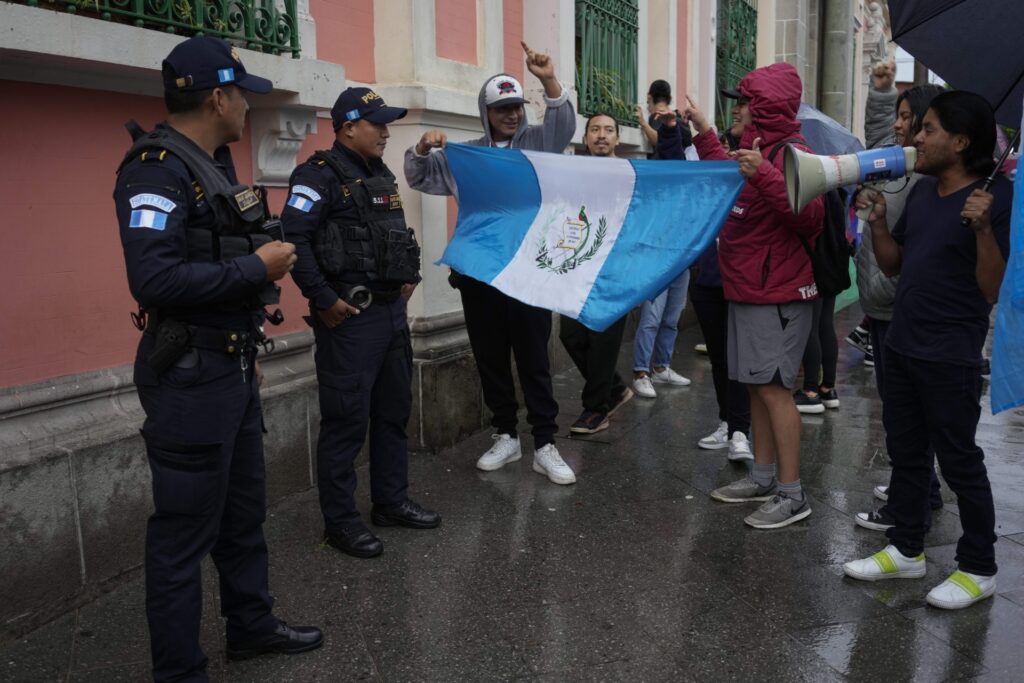A Guatemalan court suspended the operations of the center-left Semilla party, led by presidential runner-up candidate Bernardo Arévalo, on Wednesday over claims the party engaged in illicit campaign financing and forged signatures.
The court legally “suspended” the existence of the party as a result of investigations into alleged illicit electoral financing and the use of false signatures for more than 5,000 citizens as part of the party’s authorization registry process.

Volunteers hang a banner with a message that reads in Spanish; “voting center,” on the facade of a polling station, in Antigua, Guatemala, Saturday, June 24, 2023. (AP Photo/Moises Castillo)
Arévalo, alongside former First Lady Sandra Torres of the center-left National Unity of Hope (UNE) party, are slated to face off in the August 20 presidential election, a runoff following the two candidates earning first and second place in the general election featuring several other third-party candidates. Their victories guaranteed no conservative or right-wing option in the runoff election.
Guatemala’s Public Ministry posted a video on its official Twitter account on Wednesday evening in which Rafael Curruchiche of the office of the Special Prosecutor Against Impunity (FECI) explained that the Semilla party was being investigated for allegedly forging the required citizen signatures for the party’s authorization process before the country’s Supreme Electoral Tribunal (TSE).
La Fiscalía Especial contra la Impunidad informa: pic.twitter.com/uEXU3UkZOK
— MP de Guatemala (@MPguatemala) July 12, 2023
Curruchiche asserted that the investigation, known as “Semilla Corruption,” began after an unnamed Guatemalan citizen filed a formal complaint in May 2022 accusing the party of using his or her name without consent.
“The Seventh Court of Criminal Instance ordered the suspension of the legal personality of the Semilla political party,” Curruchiche said. The prosecutor also claimed to have found “indications that more than 5,000 citizens were linked to the Semilla Movement through false signatures.”
“The signature and fingerprint of one person was put on several citizens. There are signatures without names and altered sheets,” he continued.

Supreme Electoral Tribunal magistrates hold a press conference in Guatemala City, Wednesday, July 12, 2023. (AP Photo/Wilder Lopez)
The U.S. Department of State included Curruchiche in the Section 353 Corrupt and Undemocratic Actors Report in 2021. The prosecutor is accused of having obstructed investigations into acts of corruption by “disrupting high-profile corruption cases against government officials and raising apparently spurious claims against FECI prosecutors, private attorneys, and former International Commission Against Impunity in Guatemala (CICIG) prosecutors.”
Arévalo denied the prosecutor’s accusations on Wednesday evening during an interview with CNN en Español and insisted his party would not respect the “spurious and illegal decision” requiring it to suspend operations. Arévalo also said his party “never” paid anyone in exchange for the required signatures.
“What there was was a mechanism to move around and collect signatures throughout the country which, evidently, in terms of collection has a cost,” Arévalo said. “But no one ever received anything in exchange for their signature.”
The presidential candidate also claimed that Curruchiche was usurping authority that belonged to the Electoral Crimes Office, not the FECI.
“He needs to build this absurd fiction that goes as far as money laundering to justify that the special prosecutor’s office is in charge of a case that would correspond to the Electoral Crimes Prosecutor’s Office,” the presidential candidate claimed.

Officials count ballots at a polling station during the presidential election in Guatemala City, Guatemala, on Sunday, June 25, 2023.( Luis Echeverria/Bloomberg via Getty Images)
Arévalo stated that the suspension does not impact his participation in the upcoming August 20 runoff election, quoting Article 92 Guatemala’s Electoral and Political Parties Law, which states that “a party may not be suspended after an election has been called and until the election has been held.”
“This is not for us or for Semilla, it is for the whole country,” Arévalo posted on Twitter on Wednesday evening. “The powerful no longer want the people to freely decide their future, but we are going to defeat them. The seed of change and hope will not be trampled.”
Arévalo, an outsider leftist candidate in Guatemala’s June 2023 general elections, came in second place with 11.77 percent of the votes. The election was marked by a high percentage of “null” votes — votes that were not assigned to any of the participating candidates as, according to the nation’s electoral law, the voter’s intention could not be determined on the ballot.

People protest in front of the Electoral Court building after Guatemala’s highest court suspended the releasing of official results of the June 25 general elections, in Guatemala City, Monday, July 3, 2023. (AP Photo/Moises Castillo)
Arévalo’s performance during the election came as a surprise, as none of the polls released throughout the campaign had him obtaining more than three percent of the votes.
Minutes before the announcement of Semilla’s suspension, the Guatemalan Supreme Electoral Tribunal officialized the results of the first round of the June presidential election. The court issued a temporal suspension of the results last week after ten political parties filed an appeal alleging irregularities in the scrutiny process.
Guatemala’s Public Ministry carried out a search of the headquarters of the Supreme Electoral Tribunal in Guatemala City on Thursday morning.
“The Special Prosecutor’s Office against Impunity is carrying out search, inspection, registration and seizure of evidence proceedings,” the Public Ministry said on Thursday through an official statement.
The head of the TSE Irma Palencia told the local radio Emisoras Unidas on Thursday morning that she was “surprised” by the Public Ministry’s search, expressing her concern for the institution’s staff.
“I don’t know what to think or what else is next. We are very concerned,” Palencia said. “I don’t know if It is a threat, because a threat is before acting. I don’t know how to take this anymore.”


